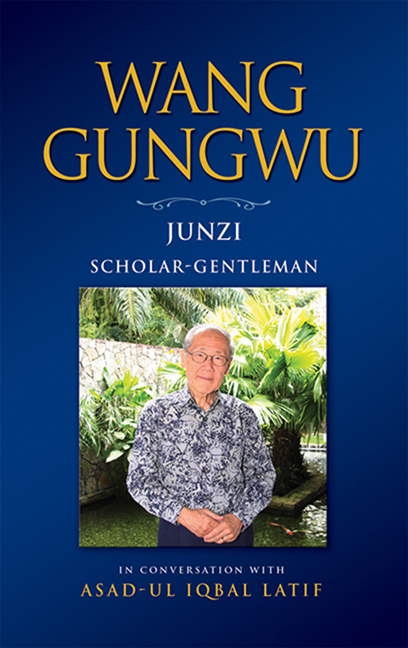Junzi: Scholar-Gentleman
Published online by Cambridge University Press: 09 November 2017
Summary
These interviews with Professor Wang Gungwu seek to convey to a general audience something of the life, times and thoughts of a leading historian, Southeast Asianist, Sinologist and public intellectual. The book felicitates him on his 80th birthday.
Wang Gungwu was born on 9 October 1930 in Surabaya to Wang Fo Wen and Ting Yien. His father came from Taizhou to teach Chinese in Surabaya. In the course of the senior Wang's career, the family moved to Malaya, and the junior Wang grew up in culturally-rich Ipoh, where he attended the English-medium Anderson School. The brutality unleashed on the Chinese during the Japanese Occupation turned his world upside down. At the end of World War II, he joined the National Central University in Nanjing, where he studied foreign languages. A different kind of upheaval — the Civil War — disrupted his studies this time. At the end of 1948, he returned to Malaya at the start of the 12-year-long Emergency which called into question the future of Malaya itself. As an undergraduate at the University of Malaya, which he joined in 1949, he read English literature, history and economics. He graduated with Honours in 1953 and obtained his Master's degree in history two years later. Among his many extracurricular achievements was his role as the founder-president of the university's Socialist Club. He received his doctorate in Chinese History from the School of Oriental and African Studies at the University of London in 1957, the same year that Malaya gained independence. His doctorate was on the Five Dynasties, but his scholarly horizons then broadened to embrace contemporary China and the Chinese in Southeast Asia, particularly in Malaya.
After his return from London, his teaching career took him from the University of Malaya, where he taught at both the Singapore and Kuala Lumpur campuses and rose to be Professor of History; to the Australian National University where, from 1968 to 1986, he was Professor and Head of the Department of Far Eastern History and Director of the Research School of Pacific Studies.
- Type
- Chapter
- Information
- Wang GungwuJunzi: Scholar-Gentleman in Conversation with Asad-ul Iqbal Latif, pp. 1 - 8Publisher: ISEAS–Yusof Ishak InstitutePrint publication year: 2010

